Flags of Countries that Start with T
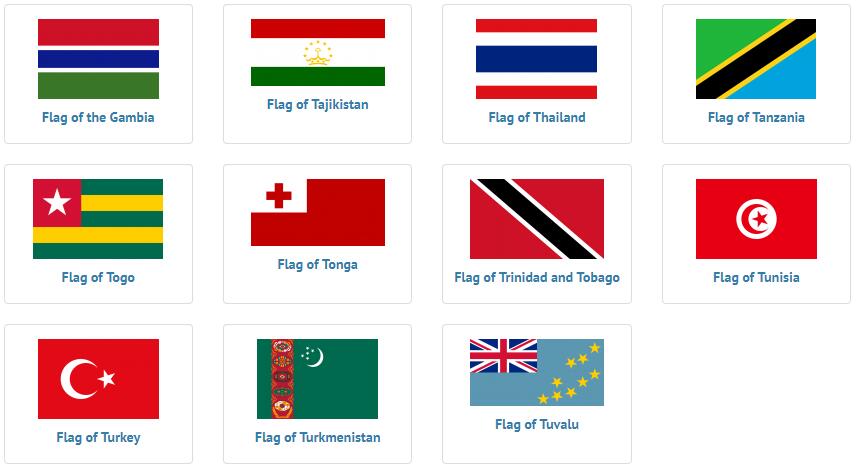
How many countries beginning with T? There are a total of 12 countries starting with letter T among the 193 countries in the world:
- Taiwan
- Tajikistan
- Tanzania
- Thailand
- East Timor
- Togo
- Tonga
- Trinidad and Tobago
- Tunisia
- Turkey
- Turkmenistan
- Tuvalu
Turkey
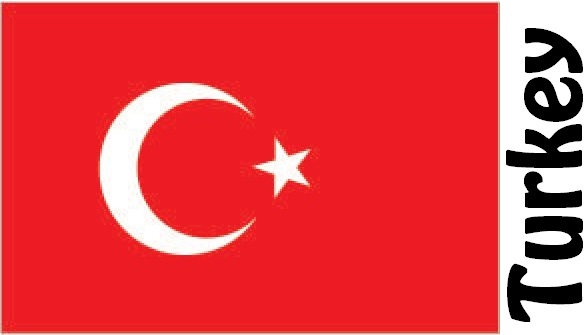
Turkey is a transcontinental country located at the crossroads of Europe and Asia, a position that has made it a unique cultural and political bridge between the East and West for millennia. Known for its rich history, diverse landscapes, and vibrant culture, Turkey is a nation where ancient traditions blend with modern influences. The country has been home to many ancient civilizations, including the Hittites, Greeks, Romans, Byzantines, and Ottomans. Istanbul, formerly known as Byzantium and later Constantinople, was the capital of the Byzantine Empire and then the Ottoman Empire, making it one of the most historically significant cities in the world. Turkey’s heritage is reflected in its landmarks, such as the Hagia Sophia, Topkapi Palace, and the ancient ruins of Ephesus and Troy. The country’s diverse geography includes the Mediterranean and Aegean coastlines, the rugged Taurus and Pontic mountains, and the vast Anatolian Plateau. Turkey’s economy is diverse, with agriculture, textiles, automotive, and tourism being major sectors. The country is a republic with a presidential system, and its political landscape has seen significant changes, especially under the leadership of President Recep Tayyip Erdoğan. Turkey is a member of several international organizations, including NATO, the G20, and is a candidate for European Union membership. Turkish culture is renowned for its food, music, and festivals, and the country’s population is a mix of ethnicities, including Turks, Kurds, and various minority groups, with Turkish as the official language.
Country Facts:
- Location: Southeastern Europe and Western Asia.
- Bordering Countries: Greece, Bulgaria, Georgia, Armenia, Azerbaijan, Iran, Iraq, Syria.
- Formal Country Name: Republic of Turkey.
- Capital: Ankara.
- Population: Approximately 86 million (2024 estimate).
- Language: Turkish (official).
- Currency: Turkish Lira (TRY).
Country Facts – State Capital – Population Graph – Airports – Public Holidays – Embassies of Turkey – Embassies in Turkey – Import Regulations – Major Trade Partners – Major Imports – Major Exports
Trinidad and Tobago
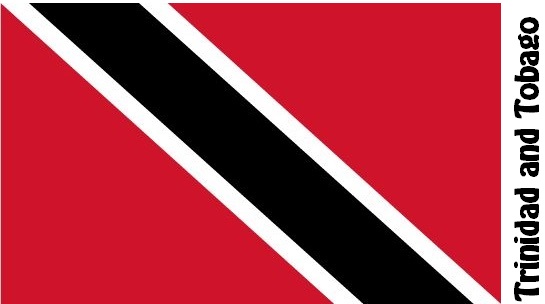
Trinidad and Tobago is a twin-island nation located in the Caribbean Sea, just off the northeastern coast of Venezuela. Known for its vibrant culture, rich history, and diverse population, this nation is a unique blend of African, Indian, European, and indigenous influences. Trinidad, the larger of the two islands, is the industrial and commercial hub, known for its thriving oil and gas industry, while Tobago is more relaxed, famous for its beautiful beaches, coral reefs, and nature reserves, making it a popular destination for eco-tourism. The country’s history dates back to the arrival of Christopher Columbus in the late 15th century, followed by centuries of colonial rule by the Spanish, French, and British. Trinidad and Tobago gained independence from Britain in 1962, and today it is a republic with a stable democratic government. The country’s economy is primarily driven by petroleum, petrochemicals, and natural gas, but agriculture, tourism, and manufacturing also play significant roles. The nation is also known for its cultural celebrations, such as Carnival, a vibrant festival that attracts people from all over the world, and its contributions to music, particularly calypso, soca, and steelpan. English is the official language, but many locals also speak Trinidadian Creole. With its diverse population, the country celebrates multiple religious and cultural holidays, including Hindu, Christian, and Islamic observances.
Country Facts:
- Location: Caribbean Sea, off the northeastern coast of Venezuela.
- Bordering Countries: Venezuela (to the south).
- Formal Country Name: Republic of Trinidad and Tobago.
- Capital: Port of Spain.
- Population: Approximately 1.4 million (2024 estimate).
- Language: English (official), Trinidadian Creole.
- Currency: Trinidad and Tobago Dollar (TTD).
Country Facts – State Capital – Population Graph – Airports – Public Holidays – Embassies of Trinidad and Tobago – Embassies in Trinidad and Tobago – Import Regulations – Major Trade Partners – Major Imports – Major Exports
Tanzania
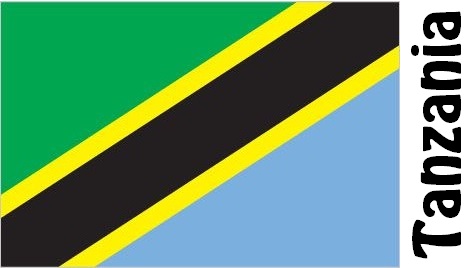
Tanzania, located in East Africa, is a country of stunning natural beauty, renowned for its vast savannas, tropical rainforests, and some of the most famous wildlife reserves in the world, including the Serengeti National Park and the Ngorongoro Crater. Tanzania is also home to Mount Kilimanjaro, the highest peak in Africa. The country is made up of the mainland (Tanzania) and the islands of Zanzibar, which have a rich history of trade and culture influenced by Arabic and Persian merchants. Since gaining independence from Britain in 1961, Tanzania has worked to maintain political stability, though it has faced challenges related to poverty, infrastructure, and health issues like malaria and HIV/AIDS. Tanzania’s economy is based on agriculture, which employs a significant portion of the population, along with mining, manufacturing, and tourism. Dar es Salaam is the largest city and economic hub, while Dodoma serves as the political capital. Swahili and English are the official languages, and the country has a mix of Christian, Muslim, and indigenous religious communities. Despite facing challenges, Tanzania remains one of the fastest-growing economies in Africa, attracting tourists from around the world to its national parks, wildlife, and beaches along the Indian Ocean.
Country Facts:
- Location: East Africa, on the Indian Ocean.
- Bordering Countries: Kenya, Uganda, Rwanda, Burundi, Democratic Republic of the Congo, Zambia, Malawi, Mozambique.
- Formal Country Name: United Republic of Tanzania.
- Capital: Dodoma (political), Dar es Salaam (economic).
- Population: Approximately 66 million (2024 estimate).
- Language: Swahili (official), English (official), Arabic (in Zanzibar).
- Currency: Tanzanian Shilling (TZS).
Country Facts – State Capital – Population Graph – Airports – Public Holidays – Embassies of Tanzania – Embassies in Tanzania – Import Regulations – Major Trade Partners – Major Imports – Major Exports
Togo

Togo is a small, narrow country located in West Africa, bordered by Ghana to the west, Benin to the east, and Burkina Faso to the north. Despite its small size, Togo has a rich cultural heritage and a diverse population, with over 40 ethnic groups, including the Tem, Ewe, and Kabye peoples. Togo’s history is marked by colonization, initially by the Germans in the late 19th century, followed by French rule after World War I. The country gained its independence in 1960, and since then, it has been navigating the challenges of developing its economy, maintaining political stability, and improving its infrastructure. Lomé, the capital and largest city, is located on the coast and serves as the country’s economic and administrative center, known for its bustling port and vibrant markets. The country’s economy is based on agriculture, with major exports including cotton, coffee, and cocoa. Togo is also a leading producer of phosphate. While agriculture remains dominant, the country is gradually diversifying into sectors like manufacturing and services. The majority of the population practices traditional African religions, with Islam and Christianity also being significant. Togo’s landscape ranges from coastal plains to hills and savannas, providing a variety of natural resources. Although Togo faces challenges such as poverty and political tensions, it has made progress in areas like education and infrastructure development.
Country Facts:
- Location: West Africa, bordered by the Atlantic Ocean to the south.
- Bordering Countries: Ghana, Benin, Burkina Faso.
- Formal Country Name: Togolese Republic.
- Capital: Lomé.
- Population: Approximately 8.7 million (2024 estimate).
- Language: French (official), Ewe, Tem, and other local languages.
- Currency: West African CFA Franc (XOF).
Country Facts – State Capital – Population Graph – Airports – Public Holidays – Embassies of Togo – Embassies in Togo – Import Regulations – Major Imports – Major Exports
Tunisia
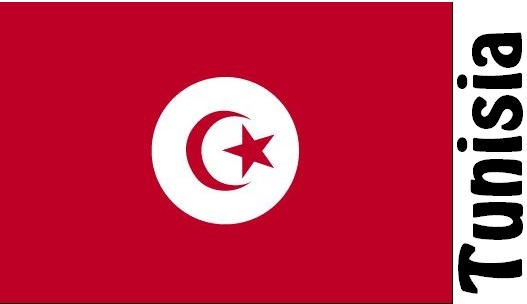
Tunisia, located in North Africa, is a country known for its rich history, Mediterranean coastline, and unique blend of Arab, Berber, and French cultural influences. As the northernmost country in Africa, Tunisia has been an important crossroads for civilizations throughout history, from the ancient Phoenician city of Carthage to Roman rule and later French colonization. Tunisia gained independence from France in 1956 and has since developed into one of the most prosperous and progressive nations in the Arab world. Its political landscape underwent a significant transformation during the 2011 Arab Spring, which saw the overthrow of its longtime president, Zine El Abidine Ben Ali, and the establishment of a democratic government. Tunisia is also known for its diverse landscapes, ranging from Mediterranean beaches to the Sahara Desert. Its capital, Tunis, is a bustling city with a mix of ancient medinas, modern infrastructure, and vibrant cultural scenes. Tunisia’s economy is based on agriculture, manufacturing, and tourism, with the latter being a major contributor to its GDP. While the country faces challenges such as unemployment and terrorism, it remains a beacon of stability and progress in the region, with a focus on education, women’s rights, and democratic reforms.
Country Facts:
- Location: North Africa, on the Mediterranean Sea.
- Bordering Countries: Algeria, Libya.
- Formal Country Name: Republic of Tunisia.
- Capital: Tunis.
- Population: Approximately 12 million (2024 estimate).
- Language: Arabic (official), French (widely spoken).
- Currency: Tunisian Dinar (TND).
Country Facts – State Capital – Population Graph – Airports – Public Holidays – Embassies of Tunisia – Embassies in Tunisia – Import Regulations – Major Trade Partners – Major Imports – Major Exports
Tajikistan
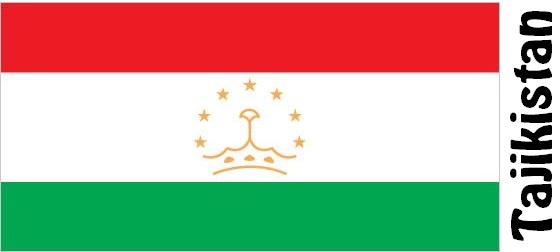
Tajikistan is a landlocked country in Central Asia, known for its mountainous landscapes, rich cultural history, and its position at the crossroads of major civilizations. Surrounded by Afghanistan, China, Kyrgyzstan, and Uzbekistan, Tajikistan is one of the poorest countries in the region but also one of the most fascinating, with a blend of Persian, Turkic, and Russian influences. The country is largely covered by the Pamir Mountains, earning it the nickname “The Roof of the World.” Tajikistan’s history dates back to ancient times, and it was once part of the Persian Empire before becoming part of the Soviet Union. After gaining independence in 1991, Tajikistan experienced a civil war that lasted until 1997, but since then, it has worked towards stability and economic development. The capital, Dushanbe, is a vibrant city that reflects both modernity and tradition. Tajikistan’s economy is primarily based on agriculture, including cotton production, and it also benefits from hydropower resources. While the country faces significant economic challenges, it has made progress in improving infrastructure and education. The majority of the population is ethnically Tajik and follows Islam, with Persian as the dominant language, giving Tajikistan a unique cultural identity within Central Asia.
Country Facts:
- Location: Central Asia.
- Bordering Countries: Afghanistan, China, Kyrgyzstan, Uzbekistan.
- Formal Country Name: Republic of Tajikistan.
- Capital: Dushanbe.
- Population: Approximately 9.7 million (2024 estimate).
- Language: Tajik (official), Russian (widely used).
- Currency: Somoni (TJS).
Country Facts – State Capital – Population Graph – Airports – Public Holidays – Embassies of Tajikistan – Embassies in Tajikistan – Import Regulations
Taiwan

Taiwan, officially known as the Republic of China (ROC), is a dynamic island nation in East Asia, located off the southeastern coast of China. Despite its small size, Taiwan has a highly developed and diverse economy, making it one of the most prosperous countries in Asia. Taiwan is known for its advanced technology industry, particularly in the production of semiconductors, electronics, and IT products, and is home to some of the world’s largest technology companies. The island’s stunning landscapes include lush mountains, beautiful coastlines, and hot springs, which attract tourists from all over the world. Taipei, the capital, is a bustling metropolis known for its vibrant night markets, modern skyscrapers like Taipei 101, and rich cultural heritage. Taiwan’s political status remains a point of contention in international relations due to China’s claim over the island. However, Taiwan maintains its own government, military, and independent foreign policy. Its population is ethnically diverse, with Han Chinese making up the majority, along with indigenous groups. The official language is Mandarin Chinese, though Taiwanese Hokkien and other languages are also spoken. Taiwan’s rich cultural life includes traditional festivals, arts, and a thriving film industry, making it a unique blend of ancient Chinese traditions and modern innovations.
Country Facts:
- Location: East Asia, off the southeastern coast of China.
- Bordering Countries: None (island nation).
- Formal Country Name: Republic of China (ROC).
- Capital: Taipei.
- Population: Approximately 23.5 million (2024 estimate).
- Language: Mandarin Chinese (official), Taiwanese Hokkien, and indigenous languages.
- Currency: New Taiwan Dollar (TWD).
Country Facts – State Capital – Population Graph – Airports – Public Holidays – Import Regulations
Thailand
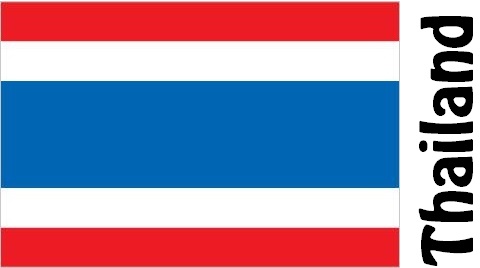
Thailand, known as the “Land of Smiles,” is a Southeast Asian nation famous for its rich cultural heritage, vibrant cities, stunning beaches, and delicious cuisine. It is one of the most popular tourist destinations in the world, with attractions ranging from bustling markets and temples in Bangkok to the serene islands of Phuket and Koh Samui. Thailand’s history spans thousands of years, with its ancient kingdoms such as Ayutthaya and Sukhothai influencing the culture of modern-day Thailand. The country is a constitutional monarchy, with King Maha Vajiralongkorn (Rama X) currently serving as the head of state. Thailand’s economy is diverse, with major industries including agriculture (especially rice), electronics, automobiles, and tourism. The capital, Bangkok, is a sprawling metropolis known for its vibrant nightlife, shopping, and street food culture. Thai Buddhism is an integral part of the country’s identity, with countless temples and shrines dotting the landscape. The Thai people are known for their warm hospitality, which is reflected in the country’s culture of politeness and respect. Thailand has faced political instability in recent decades, with military coups and protests, but it remains a popular travel destination and a significant player in the region’s economy and politics.
Country Facts:
- Location: Southeast Asia, on the Indochinese Peninsula.
- Bordering Countries: Myanmar, Laos, Cambodia, Malaysia.
- Formal Country Name: Kingdom of Thailand.
- Capital: Bangkok.
- Population: Approximately 71 million (2024 estimate).
- Language: Thai (official).
- Currency: Thai Baht (THB).
Country Facts – State Capital – Population Graph – Airports – Public Holidays – Embassies of Thailand – Embassies in Thailand – Import Regulations – Major Trade Partners – Major Imports – Major Exports
Turkmenistan
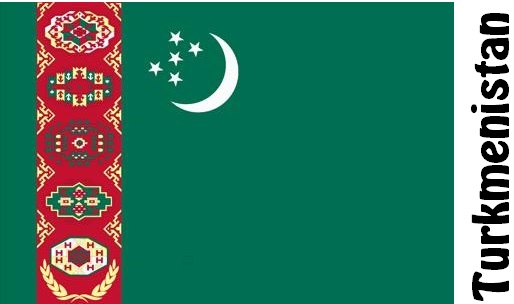
Turkmenistan is a landlocked country in Central Asia, bordered by Kazakhstan to the northwest, Uzbekistan to the north and east, Afghanistan to the southeast, and Iran to the south. Known for its vast deserts, particularly the Karakum Desert, and rich history, Turkmenistan has been shaped by both ancient civilizations and Soviet rule. The region has long been a crossroads for nomadic tribes and cultures, as well as a key part of the Silk Road trade route. After gaining independence from the Soviet Union in 1991, Turkmenistan has followed an authoritarian political path under a series of leaders, most notably Saparmurat Niyazov, who ruled from 1991 until his death in 2006. Niyazov’s government promoted a strong cult of personality, and his policies heavily influenced the nation’s development. Today, Turkmenistan is one of the most repressive countries in the world, with limited political freedoms and a heavy state presence in the economy. The country’s economy is largely based on natural gas reserves, as Turkmenistan holds some of the largest gas fields in the world, along with significant oil and cotton production. Ashgabat, the capital, is a striking city known for its white marble buildings, grandiose architecture, and large-scale monuments. The population of Turkmenistan is ethnically homogeneous, with the Turkmen people making up the majority, and the official language is Turkmen. Islam, particularly Sunni Islam, is the predominant religion, and the country’s culture is heavily influenced by its nomadic heritage and Islamic traditions.
Country Facts:
- Location: Central Asia.
- Bordering Countries: Kazakhstan, Uzbekistan, Afghanistan, Iran.
- Formal Country Name: Turkmenistan.
- Capital: Ashgabat.
- Population: Approximately 6.3 million (2024 estimate).
- Language: Turkmen (official).
- Currency: Turkmenistan Manat (TMT).
Country Facts – State Capital – Population Graph – Airports – Public Holidays – Embassies of Turkmenistan – Embassies in Turkmenistan – Import Regulations – Major Imports – Major Exports
Tonga

Tonga, officially known as the Kingdom of Tonga, is an island nation located in the South Pacific Ocean, known for its tropical climate, pristine beaches, and rich cultural heritage. Comprising over 170 islands, only 36 of which are inhabited, Tonga is the only monarchy in the Pacific, with a system of government that has blended traditional practices with modern parliamentary structures. The nation has a long history, with its Polynesian roots tracing back over 3,000 years. Tonga’s history includes a period of intense maritime exploration and expansion, particularly in the pre-European era, when the Tongan Empire was a powerful naval force. The country was never colonized, unlike many of its Pacific neighbors, which has allowed Tonga to maintain its unique identity and traditional monarchy. Nuku’alofa, the capital and largest city, is located on the island of Tongatapu, and it serves as the political, economic, and cultural center of the nation. Tonga’s economy is based largely on agriculture, with crops like coconut, vanilla, and root vegetables being key exports, alongside tourism and remittances from Tongans living abroad. The country’s stunning natural beauty, including coral reefs, lagoons, and the famous humpback whale migration, attracts visitors from all over the world. Tonga is predominantly Christian, and its culture is deeply influenced by Christian traditions and Polynesian customs, including dance, music, and festivals.
Country Facts:
- Location: South Pacific Ocean, Polynesia.
- Bordering Countries: None (island nation).
- Formal Country Name: Kingdom of Tonga.
- Capital: Nuku’alofa.
- Population: Approximately 106,000 (2024 estimate).
- Language: Tongan (official), English (widely spoken).
- Currency: Tongan Paʻanga (TOP).
Country Facts – State Capital – Population Graph – Airports – Public Holidays – Import Regulations
Tuvalu

Tuvalu is one of the smallest and least populous countries in the world, located in the Pacific Ocean. It consists of nine small islands, spread over a vast area of ocean, and is situated roughly halfway between Hawaii and Australia. Tuvalu is known for its stunning coral atolls, clear lagoons, and rich marine life. Despite its beauty, Tuvalu faces significant challenges due to its low elevation, making it extremely vulnerable to the effects of climate change, particularly rising sea levels. The country is often cited as one of the most at risk of becoming uninhabitable due to climate change. Tuvalu’s economy is mainly based on subsistence farming, fishing, and remittances from citizens working abroad, as the country has limited natural resources and a small domestic market. Funafuti, the capital, is located on one of the islands and serves as the country’s political, economic, and administrative hub. Although Tuvalu is one of the least developed countries in the world, it is a member of international organizations, such as the United Nations and the Commonwealth, and it has been an outspoken advocate for global climate action. Tuvaluans have a strong cultural connection to the land and sea, with traditional customs, music, and dance still playing an important role in everyday life. The population speaks Tuvaluan and English, with Tuvaluan being the most widely spoken language.
Country Facts:
- Location: Pacific Ocean, in Polynesia.
- Bordering Countries: None (island nation).
- Formal Country Name: Tuvalu.
- Capital: Funafuti.
- Population: Approximately 12,000 (2024 estimate).
- Language: Tuvaluan (official), English (official).
- Currency: Australian Dollar (AUD), Tuvaluan Dollar (TVD) (used interchangeably with AUD).
Country Facts – State Capital – Population Graph – Airports – Public Holidays – Import Regulations













































